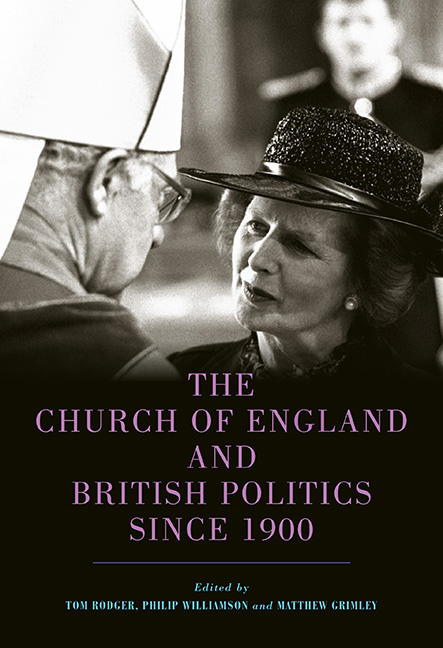Book contents
- Frontmatter
- Contents
- Notes on contributors
- Preface
- Abbreviations and locations of principal collections
- Introduction: the Church of England, the British state and British politics during the twentieth century
- 1 The politics of Church defence: Archbishop Davidson, the national church and the ‘national interest’, c. 1900–14
- 2 Archbishops and the monarchy: leadership in British religion, 1900–2012
- 3 Ecclesiastical conservatism: Hensley Henson and Lord Hugh Cecil on Church, state and nation, c. 1900–40
- 4 Hensley Henson, the prayer book controversy and the conservative case for disestablishment
- 5 Assembling an Anglican view of self-governing sexual citizenship, 1918–45
- 6 Politics in the parish: Joseph Needham at Thaxted, c. 1925–85
- 7 Anglicans, reconstruction and democracy: the Cripps circle, 1939–52
- 8 Parliament and the law of the Church of England, 1943–74
- 9 The Church of England and religious education during the twentieth century 199
- 10 Spiritual authority in a ‘secular age’: the Lords Spiritual, c. 1950–80
- 11 ‘A sort of official duty to reconcile’: Archbishop Fisher, the Church of England and the politics of British decolonization in East and Central Africa
- 12 A ‘baffling task’: Archbishop Fisher and the Suez Crisis
- 13 John Collins, Martin Luther King, Jr, and transnational networks of protest and resistance in the Church of England during the 1960s
- 14 The Church of England, minority religions and the making of communal pluralism
- Index
- STUDIES IN MODERN BRITISH RELIGIOUS HISTORY
Introduction: the Church of England, the British state and British politics during the twentieth century
Published online by Cambridge University Press: 28 April 2020
- Frontmatter
- Contents
- Notes on contributors
- Preface
- Abbreviations and locations of principal collections
- Introduction: the Church of England, the British state and British politics during the twentieth century
- 1 The politics of Church defence: Archbishop Davidson, the national church and the ‘national interest’, c. 1900–14
- 2 Archbishops and the monarchy: leadership in British religion, 1900–2012
- 3 Ecclesiastical conservatism: Hensley Henson and Lord Hugh Cecil on Church, state and nation, c. 1900–40
- 4 Hensley Henson, the prayer book controversy and the conservative case for disestablishment
- 5 Assembling an Anglican view of self-governing sexual citizenship, 1918–45
- 6 Politics in the parish: Joseph Needham at Thaxted, c. 1925–85
- 7 Anglicans, reconstruction and democracy: the Cripps circle, 1939–52
- 8 Parliament and the law of the Church of England, 1943–74
- 9 The Church of England and religious education during the twentieth century 199
- 10 Spiritual authority in a ‘secular age’: the Lords Spiritual, c. 1950–80
- 11 ‘A sort of official duty to reconcile’: Archbishop Fisher, the Church of England and the politics of British decolonization in East and Central Africa
- 12 A ‘baffling task’: Archbishop Fisher and the Suez Crisis
- 13 John Collins, Martin Luther King, Jr, and transnational networks of protest and resistance in the Church of England during the 1960s
- 14 The Church of England, minority religions and the making of communal pluralism
- Index
- STUDIES IN MODERN BRITISH RELIGIOUS HISTORY
Summary
Historians of Britain after 1914 used to leave religion out of political history, and politics out of religious history. A striking, though under-appreciated, feature during recent decades has been a reduction in this demarcation, with more political historians commenting on the significance of religion and the role of the churches, and an increasing number of historians of religion addressing political issues. Yet these studies, while pioneering and important, have so far been piecemeal and limited in scope, rather than wide-ranging and systematic. In general, twentieth-century British politics and religion continue to be pursued too much as discrete areas of historical enquiry, and those studies that bridge these areas do not always draw upon the full breadth of available sources.
The separation is particularly striking when the position of the Church of England is considered. As the established Church in England (and in Wales until 1920), it was ultimately subject to royal authority and parliamentary control. It intersected at many levels with the institutions of the British state, from the monarchy, parliament, government, civil service and armed forces of the United Kingdom, to local government in England. Its archbishops, bishops and other senior clergy were appointed formally by the sovereign and in practice by the prime minister; the two archbishops and twenty-four other bishops had seats in the House of Lords (as the ‘Lords Spiritualʼ), and until the 1970s most substantial changes in worship, organization, funding and property required parliamentary approval. The Church of England had the inherent strength of being the largest church in the United Kingdom, but its public importance derived chiefly from its connections with the British state. These relationships conferred an influence which reached well beyond the numbers of regular churchgoers – always a low proportion of the British population, even at the start of the twentieth century – and the much larger number who associated themselves with the Church in a looser, more cultural, sense. Although political transformations early in the twentieth century and sharp declines in church attendance and Christian belief from the middle of the century changed the character of the Church's political activities when compared with those of earlier centuries, it continued to be much engaged in political life across a broad range of issues.
- Type
- Chapter
- Information
- Publisher: Boydell & BrewerPrint publication year: 2020



